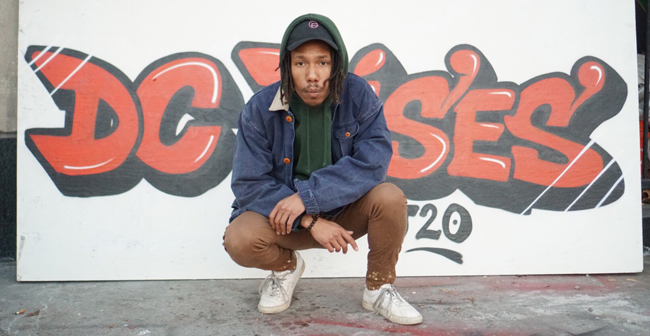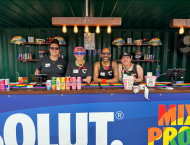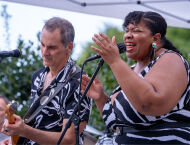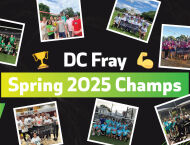Music
 Photo: Courtesy of Jamal Gray
Photo: Courtesy of Jamal Gray
Movers & Shakers: Who’s Behind the Music in DC?
November 3, 2018 @ 12:00am
DC’s music scene is an organism in flux. This is not so surprising, with several new venues recently opening – and several closing – and despite the city’s increasing population, it remains a relatively transient town. Still, DMV artists are finding more ways to build community and establish legitimacy on local and national levels, but not without hard work from some individuals behind the music who truly believe in the strength of the District’s musical past and the potential for its future. We caught up with a few of the movers and shakers making an impact on DC music.
Jamal Gray
DC native Jamal Gray is a musician-curator-organizer who founded the Uptown Art House – a creative incubator and activism-focused artists’ space “without borders” – and leads the avant-garde jazz troupe Nag Champa Art Ensemble. His projects often bridge the underground and the conventional in an effort to elevate the whole of DC’s music scene.
On Tap: How did you first come to be involved with music culture in DC?
Jamal Gray: My personal connection with music is through my parents. They met working at WPFW 89.3FM, which is a local radio station in DC that focuses on jazz and public affairs. Both of my parents are from DC. My dad was a record producer and [eventually] started his own label. I’ve been around music my whole life.
OT: What major changes have you seen in the local music scene in the past 10 years?
JG: Once things moved more toward [the] Internet, people were moving less toward trying to cultivate a scene and more toward trying to cultivate a persona. That’s where I think we are in music in general, and DC’s just a microcosm of that. A lot of people are spending a lot of energy to cultivate their persona.
OT: With your own music, the collaborations you work on and the performers you support, it seems you’re trying to counterbalance that and keep the “real” in the music. Is this your goal?
JG: If I’m going to support an artist, I want to know what they’re going to add to the conversation. It’s got to be a dialogue, not a diatribe. You should create from yourself, but not only for yourself. You have to be able to jump inside people’s worlds, especially if you want to make an impact. That’s part of what I’m trying to do – push things forward. Art is always a vehicle for progress or change, because it’s usually the artists that will take that risk before other people. That’s what I’m about.
OT: What do you think DC music needs to push forward?
JG: There’s a real conversation that has to happen between the artists themselves so we are held to a certain standard, and between the venues and artists so everyone can feel appreciated. A lot of people who want to leave [DC] say there’s no industry here [and] no infrastructure for musicians. I want our community to be globally minded but locally based. People passing through need to know you can come and see good music happening. We need documentation for it – platforms that are invested in the future of it. I’m an advocate, but I’m an artist too. The best thing I can do is continue to push forward good content and experiences, and help build spaces to incubate toward the next level.
OT: What projects are you most excited about right now?
JG: We are working on a new Nag Champa record. I’m also really excited about my radio show on Full Service Radio called “Late Bloom” that airs live every Wednesday from 7-8:30 p.m. We feature a mix of new and obscure music, and interviews with locally based artists working to make global impact. The Uptown Art House project is continuing, but as a creative agency for artists, musicians, curators and activists.
Listen to Gray weekly on Full Service Radio at www.thelinehotel.com/full-service-radio and check out Nag Champa and Uptown Art House on Facebook: @nagchampadc and @uptownarthouse.

Photo: Sam Segal
Peter Lillis
Not only did Peter Lillis help establish Songbyrd Record Cafe and Music House’s success as an intimate venue in Adams Morgan focused on local musicians, he’s part of the team behind independent record label Babe City Records, a member of DC-based band Den-Mate, and the marketing manager for Union Stage.
On Tap: You have been involved in many facets of the DC music scene for several years and taken on new roles as the energy has shifted. Can you tell us a little bit about that?
Peter Lillis: In the past five years and perhaps longer, DC was the center of the DIY music and house show scene and really focused on doing shows in nontraditional venues. I got involved around that time, around 2014 or so. I began throwing shows at similar places. I was inspired by the idea of active participation. I got disillusioned by the idea of covering music and wanted to be in bands and put on shows. It took me a few years of doing that to realize I wanted more, and the DIY community was a great opportunity to dive into that. I was inspired by everybody’s personal and communal interest [in] bettering themselves and the scene. There was an exciting movement happening.
OT: Do you think the DIY era is over?
PL: There’s still a good amount of it, but DC is not getting more affordable. The spaces that were central to that experience are gone now – torn down or renovated and sold. But for me and my colleagues at the other collectives, everyone seems to have upped their game. DC has done a better job of investing in nightlife and entertainment options for people. There’s a lot of money and young people and new options for performers. The Wharf where I am now with Union Stage is a great space for people to play. Songbyrd does great work engaging locals. [Dangerously Delicious Pies] is open on H Street. The house show arc was necessary to get us here. We all got the practice we needed to develop empathy for promoters and bookers. The DIY concept doesn’t need to be confined to people’s homes; it’s not mutually exclusive from commercial venues. The fact that they are going away just means we’ve built something that people want, which is encouraging.
OT: You organize industry panels and meetups. What is the purpose of those?
PL: When we opened Union Stage, [owners] the Brindley brothers had a very welcoming attitude, which is kind of rare. We concocted this effort to directly engage the music community and see what it would bring. The central idea is to give people a platform to meet and talk and see how everybody works together. The music industry is very connections-based. That can make it difficult for people who don’t have the knowledge or resources to be involved but want to be and are talented and motivated. The meetups and platforms we’ve organized have that in mind. It’s been successful so far, [but] there’s a lot of work left to be done. The city could support local arts in a more effective way. The only way we can communicate that to decision-makers is through collective action, so this is a small effort at doing that. We give people the initial tools and contacts to grow their business while keeping it concerted and learning from the community itself, and we can get feedback and learn how to run our business better.
OT: What do you think is unique about DC as a local musician?
PL: It’s a somewhat small city but [a] very big media market, so it’s somewhat easy to navigate compared to some of the more entertainment industry cities where there’s a ton of noise. You can meet people and there’s a scrappy attitude, but being the city it is, we get more eyeballs and cred than a city of a similar size in a different location. [It’s] advantageous for local artists to live in our area and be able to play in Baltimore, Philly, NYC, Richmond – you can play any of those places and still be home in your bed at the end of the night. People need to get out of town and start evangelizing the community here, and that’s the only way we’ll become effective on the national, international level.
Join the DC Music Industry group on Facebook to get involved in Lillis’s community efforts. Learn more about Union Stage at www.unionstage.com and Babe City Records artists, including Den-Mate, at www.babecityrecords.com.

Photo: Alicia Raft
Sasha Lord
Sasha Lord has promoted, partnered and worked with numerous groups in the DMV. She has also managed tours for several artists, booking shows abroad and traveling with the musicians. Now based in Brooklyn, Lord is currently GM of the Market Hotel (Brooklyn) and Trans-Pecos (Queens) while remaining the primary booker at Connecticut Avenue-based music venue Comet Ping Pong.
On Tap: How did you get into the business of artist promotion?
Sasha Lord: I have a background in community outreach and working with at-risk populations. I worked for an outdoor leadership school and I’ve always been community-oriented. In college, I worked at Black Cat and then got the opportunity to [work] at Comet Ping Pong. I also have a background working with people with disabilities, and that’s why I tried to make Comet as accessible as possible. I’ve combined my professional background and community work with my love of music to make a diverse, accessible venue for all ages.
OT: What did you see at Comet, in terms of artists and audiences?
SL: Comet is beautiful because it’s very much a community. We have a variety of promoters so we have a broad range of types, ages, genres and diversity in music – and that makes it a unique space. My shows will sometimes have an older demographic [while] other promoters have a younger [demographic]. It’s very well-rounded and community-oriented.
OT: What should venue operators and promoters do to elevate DC as city where musicians want to come but also pay attention to the artists who are already here?
SL: Taking care of artists and being mindful of their needs is crucial. Over the past 10 years booking [at] Comet, I was able to go to festivals [and] tour with people. I curated a showcase at South by Southwest, helped with two events [at] Art Basel and [participated in] art fairs. I toured so I could be a better promoter. It made me realize that Comet is a really good venue, and we’re really good to artists. It made me understand what touring artists go through when they arrive. Maybe they’re exhausted, maybe they spent their last $20 on the Baltimore [Harbor] Tunnel, maybe they’re hungry [and] slept on someone’s floor. I didn’t think about those things until going on tour. I realized how hard it is. So when bands show up, be mindful. I feel for the most part, most of the venues in DC do a good job at that.
OT: Now that you are based in New York, how will you stay involved in DC music?
SL: I have shows booked at Comet through April and plan to continue to book there. A lot of bands reach out to me now wanting to be booked in both NYC and DC, and it’s awesome that I’m able to do that. I recently booked [80s indie band Beat Happening’s] Calvin Johnson in DC and New York, and have some other things in the works for the next year. I’m cultivating and curating in both cities, so bands will know that they’ll get a good experience at [multiple shows]. I’m not leaving DC. I’m hoping to contribute even more by bridging the cities together.
Read about Lord and her projects at www.sashalordpresents.com and learn more about Comet Ping Pong’s winter lineup at www.cometpingpong.com.







